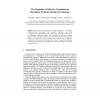UM
2007
Springer
14 years 5 months ago
2007
Springer
Accurately recognizing users’ affective states could contribute to more productive and enjoyable interactions, particularly for task-oriented learning environments. In addition t...
AIHC
2007
Springer
14 years 5 months ago
2007
Springer
Enabling machines to understand emotions and feelings of the human users in their natural language textual input during interaction is a challenging issue in Human Computing. Our w...
AIED
2007
Springer
14 years 5 months ago
2007
Springer
We investigate the relationship between a student’s affect and how he or she chooses to use a simulation problem-solving environment, using quantitative field observations. Withi...
AIED
2007
Springer
14 years 5 months ago
2007
Springer
We investigated the potential of automatic detection of a learner’s affective states from posture patterns and dialogue features obtained from an interaction with AutoTutor, an i...
ACII
2007
Springer
14 years 5 months ago
2007
Springer
We analyze the antecedents of affective states in a simulation problem-solving environment, The Incredible Machine: Even More Contraptions, through quantitative field observations ...
ROMAN
2007
IEEE
14 years 5 months ago
2007
IEEE
–This paper presents a novel affect-sensitive human-robot interaction framework for rehabilitation of children with autism spectrum disorder (ASD) where the robot can detect the ...
ICRA
2007
IEEE
14 years 5 months ago
2007
IEEE
–This paper presents a novel affect-sensitive human-robot interaction framework for rehabilitation of children with autism spectrum disorder (ASD). The overall aim is to enable t...


